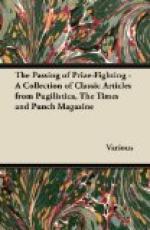fault, too, that his scheme only interests him so far
as it concerns
Stephen and his society, and
that the horror of the tragedy from what one may loosely
call the victim’s point of view does not seem
to affect him at all. Otherwise, even for the
sake of brevity, he could not so flippantly refer
to the body, sewn in a sack and thrown into the river,
as just “Eliza.” He may argue that
he never thought of the corpse as a real one and that
the whole thing was merely an experiment in imaginative
art; but his details are too well realised for that,
and so is his admirable picture of the society of Hammerton
Chase, W., a thin disguise for a riverside neighbourhood
easy to recognise. I could never get myself quite
to believe that
Stephen’s friend,
Egerton,
accessory after the fact, would so long and so tamely
have borne the suspicion of it; but for the rest Mr.
HERBERT’S study of his milieu shows a very intimate
observation. If his
Stephen, in whom the
highest poetic talents are found tainted with a touch
of coarseness, may not always be credible, the passion
for self-expression which leads him on to versify
his own experience in the form of a mediaeval idyll,
and so give himself away, is true to life. But
my final impression of Mr. HERBERT’S book—he
will perhaps think I am taking him too seriously—is
that his many gifts and notably his humour, whose
gaiety I prefer to its grimness, are here exercised
on a rather unworthy theme.
* * * *
*
[Illustration: MARTYRS OF SCIENCE:—THE
INVENTOR OF TOFFEE.]
* * * *
*
=Fashions for Proxy-Fathers.=
“The bride entered the
church on the arm of Mr. T. ——, of
Happy Valley (who acted in
loco parentis and was charmingly
attired in crepe-de-chine).”—South
African Paper.
* * * *
*
“Is there anyone amongst the thousands
of men who will benefit who will be some an (please
let the word remain, Mr. Editor) as not to show
his appreciation in the same way?”—Educational
Paper.
Personally we think the Editor was a little too complaisant.
* * * *
*
[Transcriber’s Note:
Page 361: Changed “corresponent”
to “correspondent”
(A corresponent writes to a contemporary)
Page 362: Removed extraneous single closing quote.
("Sir Harry Johnston’s ‘The Gay Donkeys’
has passed its fifth
edition in London.’”—Australian
Magazine.)
Page 368: Changed “Pulman” to “Pullman”
(a ticket for a seat in the Pulman car)]



